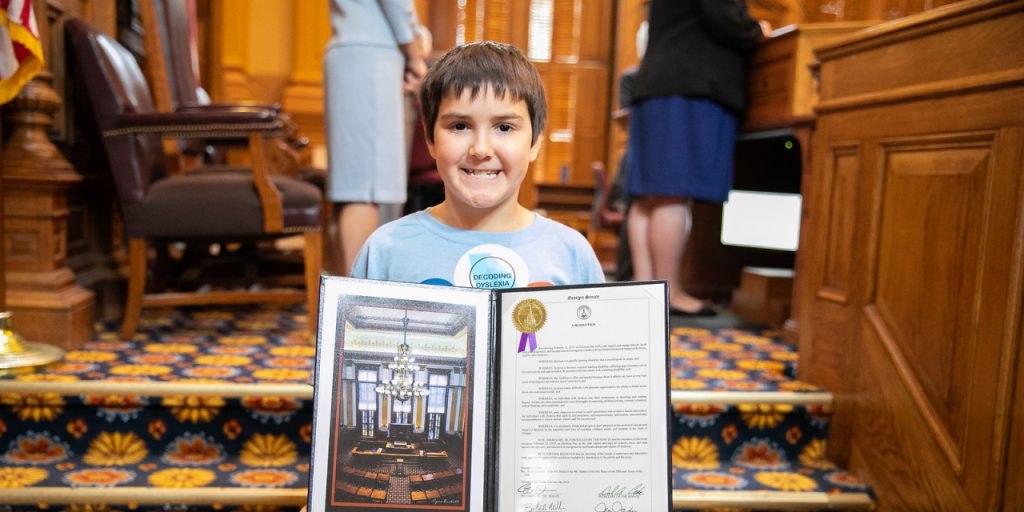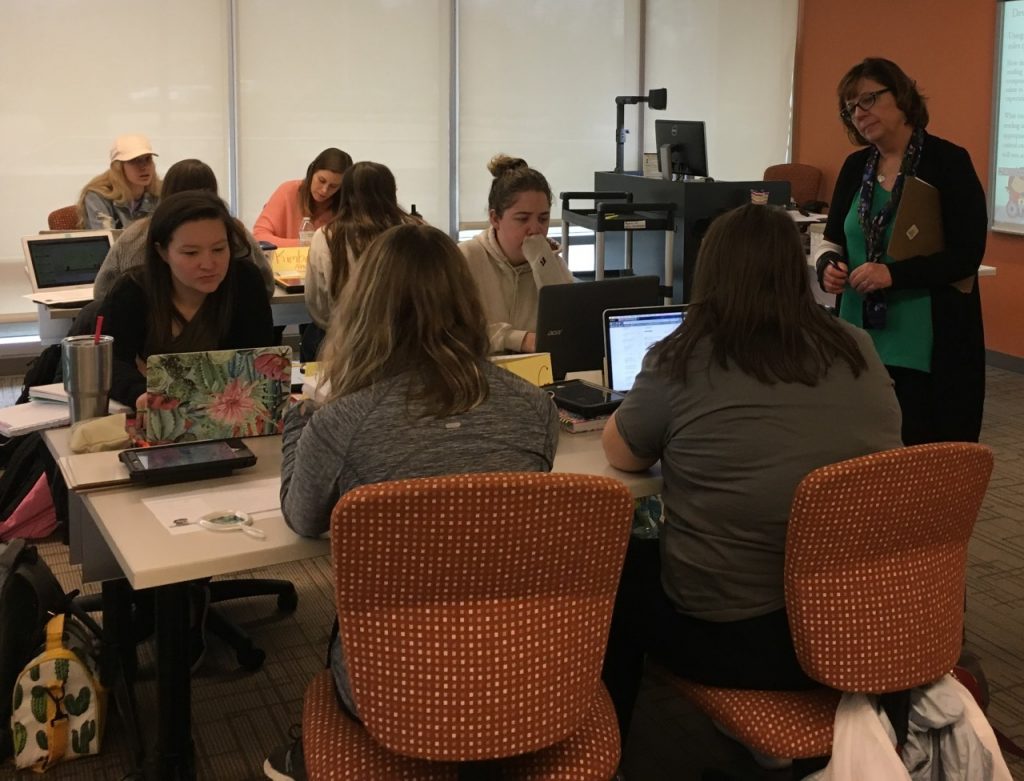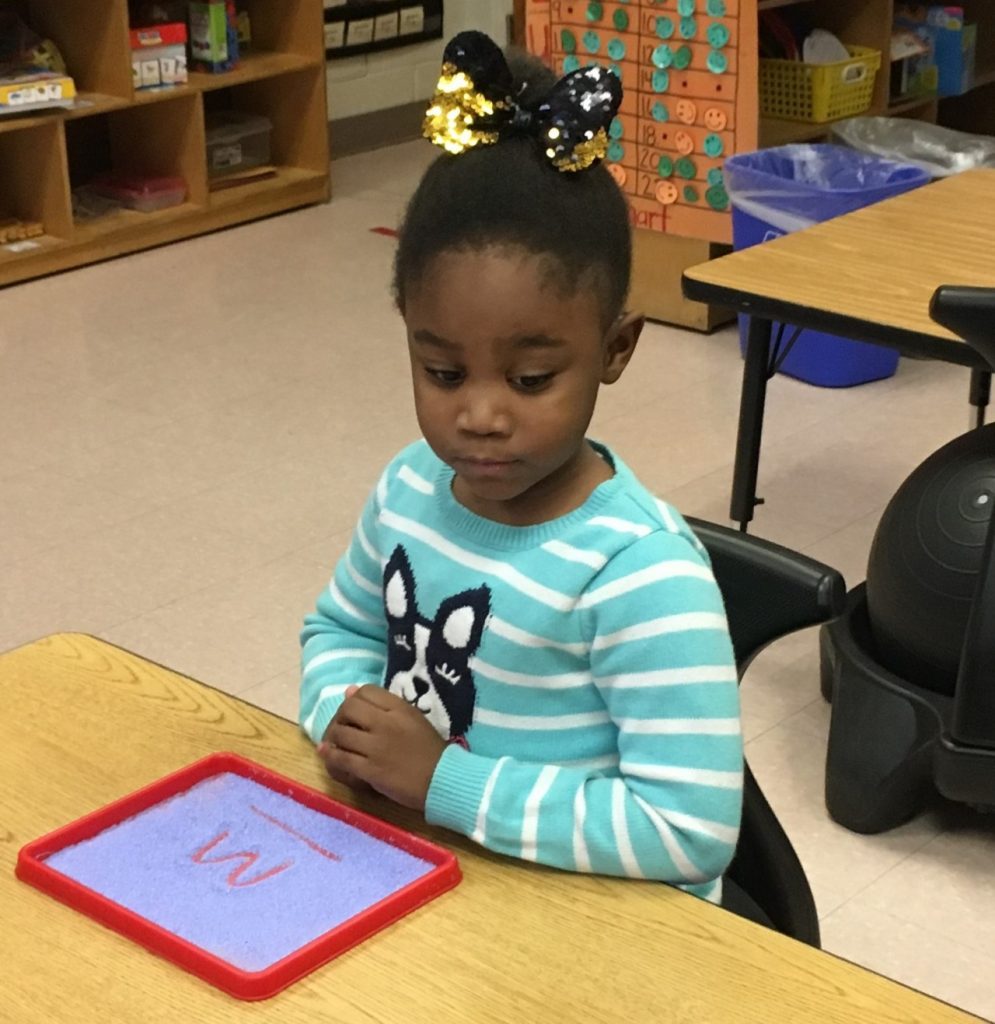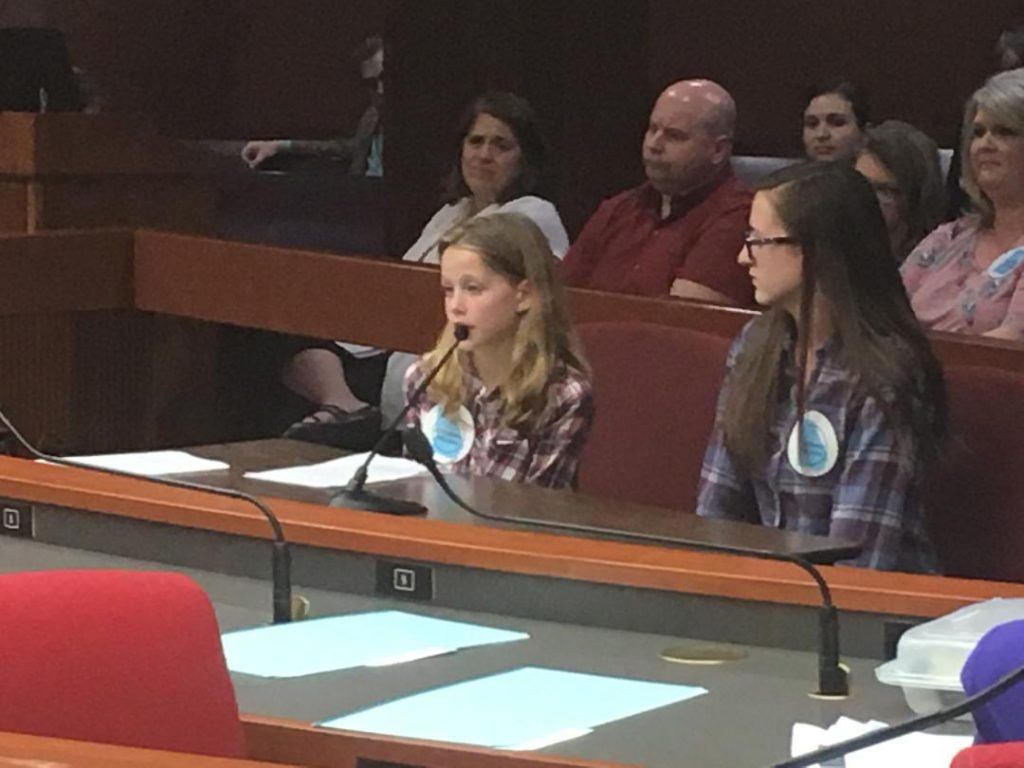‘I Always Get Flustered’: Kids Urged Lawmakers To Pass Dyslexia Bill

Smith Baker (left) and a friend bring flowers to Georgia lawmakers while asking them to support SB 48.
Decoding Dyslexia Georgia
Help could soon be on the way for Georgia students with dyslexia. The state House of Representatives approved a bill Monday that would require schools to provide services for those students.
Data show up to 20 percent of the population could have the learning disability, which makes reading difficult.
Several families have spent time at the State Capitol this year, urging lawmakers to vote for the bill.
> Related: Georgia Senate Passes Bill To Identify And Help Dyslexic Students
Lobbying Lawmakers
Each year, a group called Decoding Dyslexia Georgia holds ‘Dyslexia Day’ at the Capitol to honor dyslexic children. This year, advocates also used the day to lobby lawmakers, who are considering the state’s first piece of legislation that would directly address dyslexia. Senate Bill 48 would develop a three-year pilot program that would screen young children for dyslexia and provide students who have it with specific services. If the pilot is a success, it would be adopted statewide.
Fourth-grader Smith Baker came to the capitol with his mother, Meredith Kennedy. The family lives in Tattnall County in southeast Georgia. Smith answered frankly when asked how having dyslexia makes him feel.
“It’s tough,” he said. “It’s tough for me and it’s tough for my mom ‘cause I know she doesn’t like seeing me upset about this because my brain is different.”
Dyslexia is a language processing disorder. In Smith’s case, it makes sounding out words and spelling difficult. But he’s very articulate, especially when explaining how having a learning disability makes him self-conscious.
I always get flustered…and it kind of just penetrates my body, inside my heart. It penetrates my feelings,” Smith said.
Researchers say speaking is a natural process, but reading isn’t. Humans have used spoken language for hundreds of thousands of years, but written language is artificial, they say. Our brains have evolved to speak, but not to read.

At the Georgia Capitol, Smith makes a compelling argument to his state Rep. Bill Werkheiser.
“People at my school, they don’t understand that what I’m going through is very hard for me,” Smith told him.
“It’s a shame because I imagine a lot of your classmates would see you as not being as smart, but actually you’re every bit as smart, so don’t ever let anyone tell you you’re not,” Werkheiser replied.
Smith’s mom, Meredith Kennedy, said SB 48 would address two big problems they’ve faced. The first is the lack of training for teachers. Kennedy says teacher’s at Smith’s school aren’t certified in teaching methods specific to dyslexic students. The second hurdle is that Georgia doesn’t require schools to screen for dyslexia.
“We would love funding for children to be identified in Kindergarten and younger ages so that we’re not in fourth grade and just finding out that we have it,” Kennedy said.
The legislation would also require dyslexia training to become a part of Georgia teacher certification.
Preparing Teachers
Some soon-to-be teachers are already getting that kind of training. Nora Schlesinger teaches her undergraduates at Kennesaw State University how to look for signs of a reading disability. Dyslexia is one of her research areas.
She walks her students through several different exercises to check for phonemic awareness or sound/symbol relationships. Children with dyslexia often struggle to identify letter sounds.
In one example, Schlesinger asks her students to repeat one-syllable words. Then she has them tap out the sounds they hear, by tapping a finger to their thumbs for each one. Then she has them say the words backward. So, for example, ‘stops’ becomes ‘spots.’

Schlesinger tells her students this is a good way to check to see if kids have phonemic awareness, an understanding of sound/symbol relationships. Dissecting sounds can be a challenge for dyslexic students, so tapping them out can help.
Schlesinger demonstrates several reading exercises for her class. The students pair off and practice on each other.
Dyslexia advocates believe state and local officials haven’t taken the disability into account when it comes to overall reading performance.
“We know that our third grade [reading] scores are very indicative in how [students are] going to do in ninth grade and who’s going to graduate,” Schlesinger said.
She points out that just one-third of Georgia’s third-graders read on grade level.
“I’ve told my candidates here, ‘Would you ever go to a surgeon [with that kind of] success rate?’” she said. “No. So we need to do better.”
Schlesinger is an assistant professor of literacy at KSU. She has a Ph.D. in speech and hearing and is a certified academic language therapist. Like many in the field, Schlesinger became interested in working with dyslexic students because one of her own children has it.
“He could quip with his older brother, who was in the gifted program better than his sister who was in the gifted program,” she said. “So we knew this kid was really smart. He’s just dyslexic.”
The Schlesingers couldn’t get the help they needed in public school, so they paid for their son to go to a private school for a few years. This is a common problem for parents of dyslexic students. If they want specialized instruction, they often have to rely on private schools.

Going Public with the Problem
The legislation came about after a study committee heard testimony about students with dyslexia in Georgia and the services they receive — or don’t receive — in public schools. The committee issued a report in December. Plenty of parents shared their stories of frustration with trying to get their children diagnosed and running into hurdles at school. The testimony continued before the Senate’s Education and Youth Committee once lawmakers introduced SB 48.
Peter Isbister and his wife Robyn Painter noticed their daughter had trouble rhyming words when she was in Pre-Kindergarten. They asked her school about testing her for dyslexia.
“We were met really with a wall of blank stares,” Isbister said.
The couple had her tested and diagnosed by a private psychologist. She was diagnosed with dyslexia and now receives extra services in school.
Diane Weinberg expressed similar frustration trying to help her son get by in public school. He’s in the fourth grade and she says he’s severely dyslexic.
“This is what it’s like to be a parent of a dyslexic child: it’s a lot of time; it’s a lot of effort; it’s a lot of fighting; it’s a lot of money; loss of time; loss of wages; private school at $30,000 a year,” Weinberg said. “So, it becomes almost a problem that if you have enough money, then maybe you can get your child help, and if you don’t, well, then, good luck with you.”
Samantha Durrance, a policy analyst with the Southern Regional Education Board, told the committee dyslexia is easier to treat if it’s identified early.
“There’s … a misunderstanding sometimes that dyslexia can’t be identified until much later on—third grade, fourth grade until a child is very far behind in reading,” Durrance said. “And that’s not the case. We know it can be identified much earlier than that and that when we intervene earlier, we get better results and it costs less money.”

Parents like Beth Haynes are lobbying lawmakers to support SB 48 so kids can be identified early and find help in public schools. Her daughter, Brynn, was diagnosed with dyslexia in second grade. She went to the Schenk School, a private school in Atlanta, for third grade. Now, she’s in fourth grade at another school.
“We were fortunate to have the resources to get her tested and to get her into a school to remediate that was not too far from our house,” Haynes said. “She’s doing great, but we’re [at the State Capitol] because this is a really important bill for our state and I think there’s a lot of people who don’t understand that.”
As for Brynn, she doesn’t see dyslexia as a stumbling block anymore.
“It’s not that much of a disability; it’s more of a superpower, because…I learned about how many people who’ve done really good things in life have [dyslexia],” she said.
Brynn told members of the House Education Committee she felt frustrated in the early grades because she couldn’t read. Schenk changed that, she said.
“The teachers there helped me understand that I was not stupid,” Brynn said. “I’m a smart kid, who just learns a different way. If you pass this bill, then more kids like me can get the help they need.”








